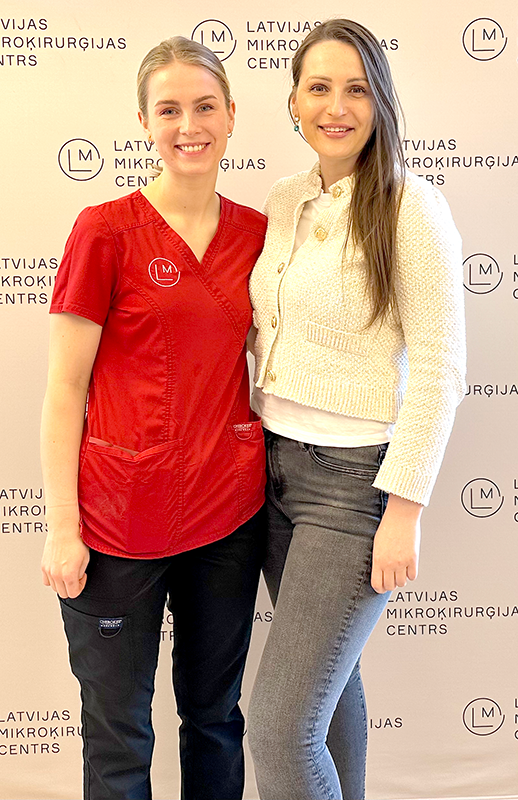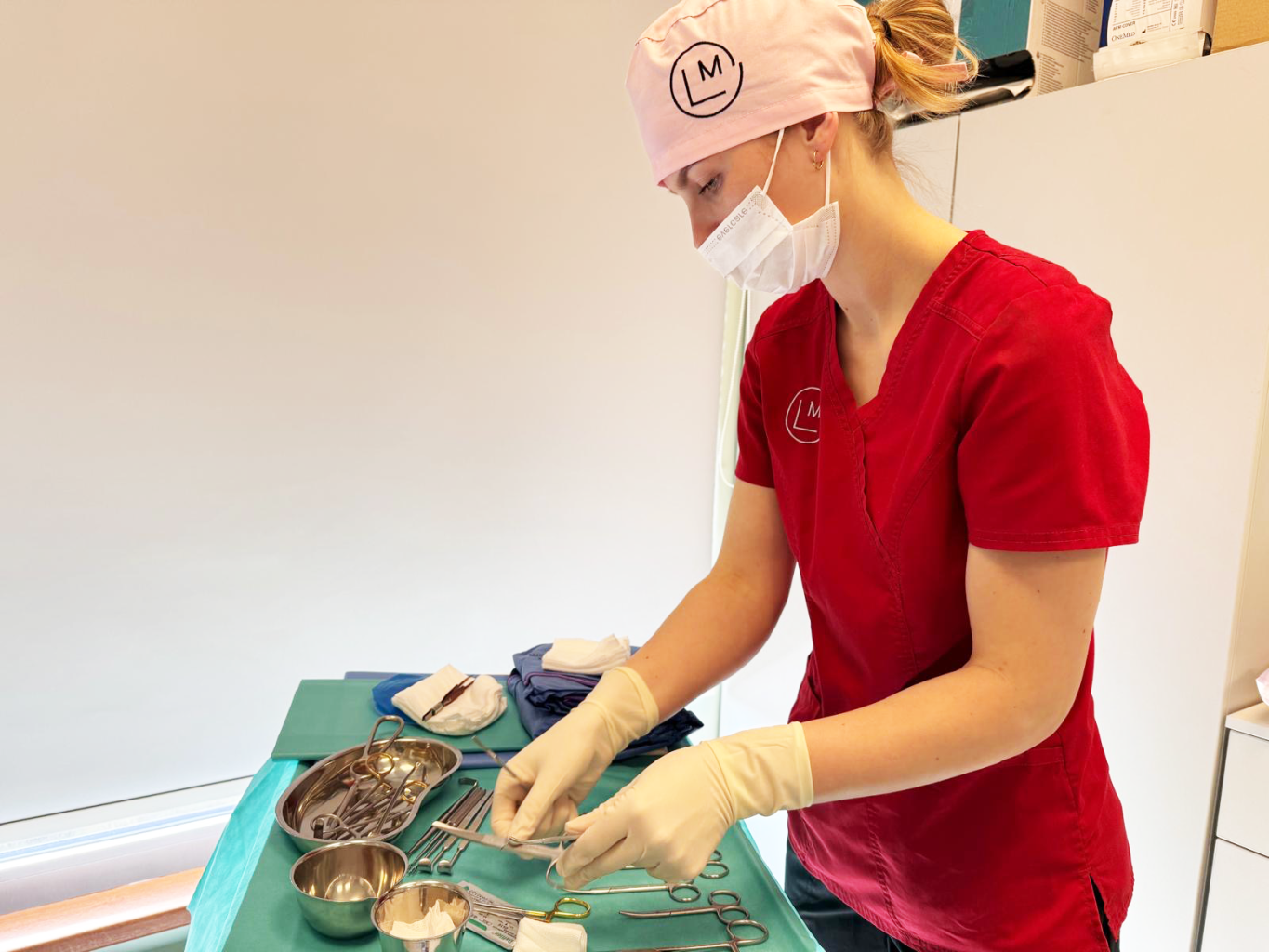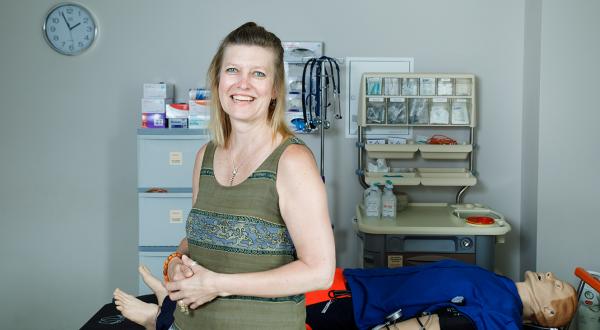‘Support helped me grow’: future nurse shares her experience during clinical practice
The Latvian Microsurgery Center (LMC) is one of the clinical practice sites for students in the Nursing study programme at the Rīga Stradiņš University (RSU) Faculty of Health and Social Sciences. Additionally, it will soon be possible to practice at LMC's new specialised hospital, which is about to open.
As part of LMC’s collaboration with Rīga Stradiņš University (RSU) students, we are pleased to introduce Lota Grēta Krēsliņa, who is currently completing her internship with us. Baiba Kasakovska, Head Nurse at LMC, describes her as a highly responsible, reliable, and capable student.

From the left: Lota Grēta Krēsliņa and Baiba Kasakovska. Photo: courtesy of Lota Grēta Krēsliņa
Lota Grēta has a particular interest in the work of operating room nurses, which is why she is spending most of her internship in the surgical unit. ‘Lota Grēta has shown herself in the best possible light, and we’re excited to welcome her to our team after she graduates from RSU. I’m delighted that another great nurse will be joining us,’ says Baiba Kasakovska.
In a conversation, both women reveal their paths to the nursing profession.
Baiba Kasakovska: I come from Latgale, specifically Rēzekne. I wasn’t one of those girls whose parents or grandparents were medical professionals, and I didn’t dream of becoming a doctor or nurse from a young age.
At some point, however, I decided that I wanted to build my future in medicine and chose the nursing profession.
In life, I’ve rarely taken the easiest path, and this was reaffirmed when I chose to study at RSU, which, as you know, is still considered to have the highest educational standards.
The four years of my bachelor’s studies flew by, and I never once doubted that I was in the right place – I couldn’t even imagine myself in another profession.
After completing the bachelor’s programme, I knew I wanted to continue in the master’s programme, as it offered opportunities for career growth – something that has always been important to me. Thanks to my persistence – and to RSU – I made it happen.
I’m now the Head Nurse at LMC. Our centre is especially known for performing complex surgeries that were previously unseen in Latvia. I’m truly honoured to be part of this team.
This year is particularly special for us, as the final stages of work on our new specialised hospital are nearing completion – a development that brings both excitement and new challenges.
Another event I’m especially pleased about is the start of our collaboration with RSU’s Faculty of Health and Sport Sciences. Thanks to this partnership, our centre is now a clinical training site for aspiring nurses. As the centre’s Head Nurse, I’m proud that we are now authorised to train not only residents but also the next generation of nurses.
Kasakovska: How are you settling in with us?
Krēsliņa: At first, I was a little nervous because this is one of the leading centres in Latvia, and the specialists around me are very experienced. However, my colleagues were very supportive and welcoming, which helped me adjust to the team quickly. Not only the nurses, but also the doctors were very interested in educating and training me. I felt that I had my place here as a student; they involved me in processes, explained things, and encouraged me. This helped me gain confidence.
Kasakovska: What surprised you here?
Krēsliņa: I was surprised by how important mutual respect and communication are among all members of the team – not only between doctors and nurses, but also with patients. I witnessed how powerful a simple yet empathetic word or gesture can be when someone is feeling afraid. I was also struck by how much can be learned in such a short time –
almost every day, I found myself writing down things I had seen or learned for the first time.
This helped me not only to remember them but also to organise my experiences in my mind.
Kasakovska: Was there something that felt daunting when you started?
Krēsliņa: In the beginning, what scared me the most was how much I still didn’t know. I felt like I had to approach every step with extreme caution to avoid making a mistake or overlooking something important. My colleagues worked with such confidence, speed, and precision – it was truly impressive, but it also made me anxious. I kept wondering: will I ever be able to reach that level?
Kasakovska: How did you overcome difficult situations?
Krēsliņa: I tried to see every difficulty as part of the learning process rather than a failure. And, of course, support from colleagues helped – sometimes just one conversation was enough to make me feel more confident and encouraged to continue. Practicing in various locations, I can say that the practice supervisor and the nursing team play a major role. The ability to be there not only professionally but also humanely – to encourage, calmly explain, listen, and cheer up – is very important.

Lota Grēta during her nursing practice
The head nurse and the operating block nurses trusted me, involved me in various processes, and were always present when I had doubts or needed help.
This kind of support created a safe environment for learning and personal growth. It taught me not to be afraid of mistakes, but to see them as opportunities to learn and grow. So over time, I began to see difficulties not as obstacles but as steps towards becoming confident and balanced.
My advice to aspiring nurses is always to make use of the opportunities provided by your practice place, because remember – one day your practice place may also become your workplace!




